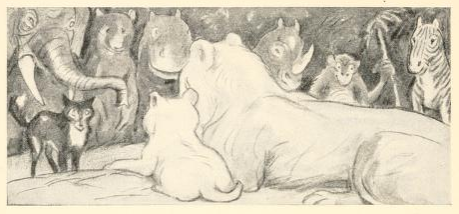This project has moved to a blog of its own: Fabulae Aesopi.
Here is the latest in a series of posts about the Latin fable poems by Desbillons; for more about Desbillons, see the first post. I'm working through all the poems book by book with indexes that link to each of the individual fables in each book; this is the post for Book 4.
In addition, I am picking out one very short poem as the focus. So, you'll find a poem-by-poem index to Book 4 below (linking to the pages at the Internet Archive), plus the poem I selected from that book; it's actually the first poem in the book, and it's just 4 lines long. You can find this fable in the classical Greek Aesop.
IV.1 Sus et Leaena
Fecunda Sus Leaenae vertebat probro,
Catulum quod unum quolibet partu ederet.
"Unum, at Leonem," retulit indignans fera.
Res dignitate praevalent, non copia.
Here is the poem written out in English prose order to help in reading:
Fecunda Sus
vertebat Leaenae
probro,
quod
quolibet partu
ederet unum Catulum.
Indignans fera retulit,
"Unum, at Leonem."
Res praevalent
dignitate,
non copia.
As you can see, the moral is what we would call "quality, not quantity" in English, "dignitas, non copia" in Latin.
The meter is iambic, and here is some help with the meter (for more about iambic meter, see the post about Desbillons 1.1).
Fecun · da Sus · Leae · nae ver · tebat · probro,
Catulum · quod u · num quo · libet · part~ e · deret.
Un~ at · Leo · nem re · tulit in · dignans · fera.
Res dig · nita · te prae · valent · non co · pia.
In most English-language versions of this fable, it is a fox who debates with the lioness and is rebuked, but in the classical Greek Aesop, the dialogue is between a sow and a lioness, which is the version that Desbillons has adapted. Here is an English version of the fable in Townsend, with an illustration by Oliver Herford:
A CONTROVERSY prevailed among the beasts of the field as to which of the animals deserved the most credit for producing the greatest number of whelps at a birth. They rushed clamorously into the presence of the Lioness and demanded of her the settlement of the dispute. 'And you,' they said, 'how many sons have you at a birth?' The Lioness laughed at them, and said: 'Why! I have only one; but that one is altogether a thoroughbred Lion.'
The value is in the worth, not in the number.

More poems in Desbillons, Book 4:
1. sus et leaena (lines: 4)
2. puer, et passer fugitivus (lines: 15)
3. pastor et mare (lines: 14)
4. leo, asinus, et vulpis (lines: 10)
5. musculus et felix (lines: 14)
6. invidus et avarus (lines: 19)
7. gallus, asinus, et leo (lines: 20+)
8. milvus, corvus, et aquila (lines: 20+)
9. equus et lupus (lines: 20+)
10. leaena et ovis (lines: 11)
11. vir sapiens et eius inimicus (lines: 11)
12. catella (lines: 20+)
13. rusticus et asinus (lines: 20+)
14. musca, trochilus, et trossulus (lines: 15)
15. avarus et thesaurus (lines: 8)
16. lupus filium erudiens (lines: 20+)
17. vulpis sine cauda (lines: 20+)
18. mustela et mures (lines: 9)
19. puer et colonus (lines: 20+)
20. anicula et eius ancillae (lines: 13)
21. vulpis, asinus, et leo (lines: 13)
22. milvus aegrotans (lines: 11)
23. pardus et vulpis (lines: 8)
24. deus ligenus (lines: 15)
25. iuvenes duo et ursus (lines: 20+)
26. bos et equus (lines: 20+)
27. puer et turbo (lines: 5)
28. leo, agnus, et cerva (lines: 14)
No comments:
Post a Comment
Comments are limited to Google accounts. You can also email me at laurakgibbs@gmail.com or find me at Twitter, @OnlineCrsLady.